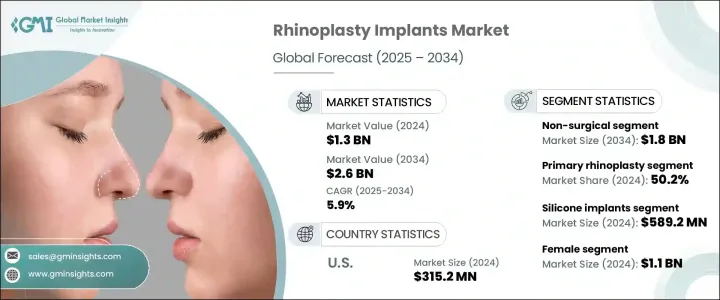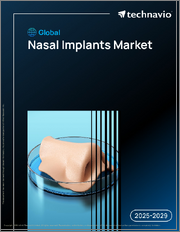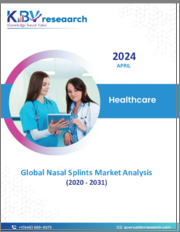
|
시장보고서
상품코드
1755333
코성형술 임플란트 시장 : 기회, 성장 촉진요인, 산업 동향 분석 및 예측(2025-2034년)Rhinoplasty Implants Market Opportunity, Growth Drivers, Industry Trend Analysis, and Forecast 2025 - 2034 |
||||||
세계의 코성형술 임플란트 시장은 2024년에 13억 달러로 평가되었으며 2034년에는 26억 달러에 이를 것으로 예측되며, CAGR 5.9%로 성장할 전망입니다.
이러한 성장은 비침습적 코성형술에 대한 수요의 급증, 미용 시술에 대한 인식의 제고, 시술에 사용되는 재료의 발전 등이 촉진 요인으로 작용할 것으로 예상되며, 이러한 요인들은 예측 기간 동안 업계 성장을 견인할 것으로 보입니다.

수술에 사용되는 기술과 임플란트 재료의 개선은 합병증 위험을 크게 감소시켰습니다. 외과의사들은 이제 더 자연스러운 결과를 달성할 수 있게 되어 코성형술의 전반적인 채택률이 증가하고 있습니다. 또한, 개선된 수술 후 관리로 회복 시간이 단축되었습니다. 3D 프린팅을 통해 환자 맞춤형 임플란트를 제작할 수 있는 능력은 수술 정밀도와 개인화된 결과를 제공합니다.
| 시장 범위 | |
|---|---|
| 시작 연도 | 2024년 |
| 예측 연도 | 2025-2034년 |
| 시작 금액 | 13억 달러 |
| 예측 금액 | 26억 달러 |
| CAGR | 5.9% |
비수술 부문은 연평균 6%의 성장률을 보이며 2034년에는 18억 달러에 달할 것으로 예상됩니다. 비수술 코성형술의 증가는 유럽과 미국에서 성형 수술의 동향이 증가하는 등 주요 요인과 소셜 미디어의 영향력 확대에 의해 촉진되고 있습니다. 이 시술은 주로 히알루론산 필러를 사용하여 수술적 절개 없이 코의 형태를 재형성합니다. 비수술적 코성형술은 최소 침습적이며 복잡하지 않은 시술 과정과 빠른 회복 기간이라는 장점 때문에 미용 치료의 가장 인기 있는 형태 중 하나입니다. 또한 팬데믹 이후 집에서 근무하는 젊은 층이 증가하면서 이러한 시술을 받는 사람들이 늘어나 회복 과정이 더 쉬워졌습니다.
병원 부문은 2024년에 45.7%의 점유율로 시장을 지배했으며, 2034년에는 12억 달러에 달할 것으로 예상됩니다. 병원에서 시행되는 코성형술에 대한 수요는 환자의 안전, 정교한 인프라, 숙련된 외과 전문의의 존재로 인해 지속적으로 강세를 보이고 있습니다. 병원, 특히 성형외과 전용 병동이 있는 병원은 환자의 회복에 필요한 모든 수술 및 수술 후 치료를 제공하기 때문에 코성형술을 시행하는 데 가장 먼저 선택되는 곳입니다. 또한 병원은 첨단 모니터링 및 응급 구명 장비를 갖추고 있어 수술 중 발생할 수 있는 모든 합병증을 처리할 수 있습니다.
미국의 코성형술 임플란트 시장은 2024년에 3억 1,520만 달러로 평가되었고, 코성형술은 미국에서 특히 여성들 사이에서 미적, 기능적, 문화적 이유로 가장 인기 있는 수술 중 하나입니다. 미국인들은 얼굴 구조를 강조하거나 코의 불규칙성을 교정하거나, 편도비로 인한 호흡 문제를 해결하기 위해 수술을 선택합니다. 비성형술은 현대 사회의 소셜 미디어에 크게 영향을 받고 있습니다. 페이스북과 같은 유명 플랫폼에서 미용이 강조되고 공개적으로 칭찬받는 것이 그 예입니다. 또한, 인플루언서와 유명인사들의 미용 수술 수용은 이러한 수술에 대한 금기를 어느 정도 해소시켜 더 많은 사람들이 수술을 고려하게 만들었습니다. 기술 혁신은 이 수요를 현실로 전환시키는 데 추가적인 역할을 했습니다.
세계의 코성형술 임플란트 업계의 주요 기업은 Stryker, Galderma, HANSON MEDICAL, Koken, GORE, BISTOOL, Implantech, Wanhe, Kurz, Acteon Medical, Surgiform이 됩니다. 코성형술 임플란트 시장 기업들은 안전성과 환자 결과를 개선하기 위해 임플란트 재료 및 디자인 개발에 대규모 투자를 진행하며 시장 점유율을 강화하고 있습니다. 이들은 3D 프린팅 기술을 활용한 맞춤형 임플란트 개발에 집중해 수술 정밀도를 높이는 맞춤형 솔루션을 제공합니다. 주요 의료 기관 및 성형외과 의사와의 전략적 협력을 통해 제품의 채택률과 신뢰도를 높이는 데 힘쓰고 있습니다.
목차
제1장 조사 방법과 범위
제2장 주요 요약
제3장 업계 인사이트
- 업계 생태계 분석
- 업계에 미치는 영향요인
- 성장 촉진요인
- 미용 의식 향상
- 미용 시술에 있어서의 기술의 발전
- 비침습적 코 성형술에 대한 수요 증가
- 업계의 잠재적 리스크 및 과제
- 전문 인력 부족
- 코성형술 시술의 높은 비용 및 합병증
- 성장 촉진요인
- 성장 가능성 분석
- 규제 상황
- 기술의 발전
- 상환 시나리오
- 갭 분석
- Porter's Five Forces 분석
- PESTEL 분석
- 밸류체인 분석
- 특허 분석
제4장 경쟁 구도
- 소개
- 기업 매트릭스 분석
- 기업의 시장 점유율 분석
- 주요 시장 기업의 경쟁 분석
- 경쟁 포지셔닝 매트릭스
- 전략 대시보드
제5장 시장 추계 및 예측 : 시술 유형별(2021-2034년)
- 주요 동향
- 수술
- 개방형 코성형술
- 폐쇄형 코성형술
- 비수술
제6장 시장 추계 및 예측 : 치료 유형별(2021-2034년)
- 주요 동향
- 1차 코 성형술
- 재수술 코 성형술
- 미용 성형 코성형술
- 기능적 코성형술
- 기타 치료 유형
제7장 시장 추계 및 예측 : 재료별(2021-2034년)
- 주요 동향
- 실리콘 임플란트
- 고어텍스(ePTFE) 임플란트
- 하이드록시아파타이트 임플란트
- 기타 재료
제8장 시장 추계 및 예측 : 성별(2021-2034년)
- 주요 동향
- 남성
- 여성
제9장 시장 추계 및 예측 : 최종 용도별(2021-2034년)
- 주요 동향
- 병원
- 외래수술센터(ASC)
- 기타 용도
제10장 시장 추계 및 예측 : 지역별(2021-2034년)
- 주요 동향
- 북미
- 미국
- 캐나다
- 유럽
- 독일
- 영국
- 프랑스
- 스페인
- 이탈리아
- 네덜란드
- 아시아태평양
- 중국
- 일본
- 인도
- 호주
- 한국
- 라틴아메리카
- 브라질
- 멕시코
- 아르헨티나
- 중동 및 아프리카
- 남아프리카
- 사우디아라비아
- 아랍에미리트(UAE)
제11장 기업 프로파일
- acteon medical
- BISTOOL
- Galderma
- GORE
- HANSON MEDICAL
- Implantech
- Koken
- Kurz
- Stryker
- Surgiform
- Wanhe
The Global Rhinoplasty Implants Market was valued at USD 1.3 billion in 2024 and is estimated to grow at a CAGR of 5.9% to reach USD 2.6 billion in 2034. The growth is driven by the surging demand for non-invasive rhinoplasty, growing awareness levels about aesthetic procedures, and advancements in materials used during the procedure among others are anticipated to fuel the industry growth throughout the forecast period. The improvement of techniques used in surgeries and the materials used for the implants has lowered the risks of complications significantly. Surgeons can now achieve more natural results, thus increasing the overall adoption of rhinoplasty procedures. In addition, better postoperative care minimizes the recovery time.

The ability to create tailor-made implants for individual patients through 3D printing offers greater surgical precision and personalized results. Continuous improvements in materials such as silicone, etc. have made implants not only safer and more durable but also easier to integrate with the body's natural tissues. Additionally, closed rhinoplasty and other minimally invasive techniques ensure less recovery time and scarring which is favorable to patients. Further, the rise in the number of rhinoplasty procedures owing to several parameters such as growing awareness, high adoption of cosmetic surgeries, etc is propelling the product demand. Rhinoplasty was among the most performed aesthetic procedures worldwide. Rhinoplasty implants are used to reshape, enhance, or rebuild the projection of the nose. They are made from materials such as silicone and aid in improving the nose's appearance and functional issues.
| Market Scope | |
|---|---|
| Start Year | 2024 |
| Forecast Year | 2025-2034 |
| Start Value | $1.3 Billion |
| Forecast Value | $2.6 Billion |
| CAGR | 5.9% |
The non-surgical segment is expected to grow at a CAGR of 6%, reaching USD 1.8 billion by 2034. The rise in non-surgical rhinoplasty is driven by key factors such as the growing trend of cosmetic procedures in Europe and America, and the rising influence of social media. This procedure uses fillers, mainly hyaluronic acid, to reshape a person's nose without requiring surgical incisions. Non-surgical rhinoplasty is among the most popular forms of aesthetic treatment owing to its numerous benefits such as a minimally-invasive and less complicated procedure coupled with a faster recovery period. In addition, post-pandemic large number of young individuals who want to undergo such procedures are working from home making it easy to faster recovery process.
The hospital segment dominated the market in 2024 with a share of 45.7% and is anticipated to reach USD 1.2 billion by 2034. The demand for rhinoplasties performed in hospitals has remained consistently strong owing to patient safety, the sophisticated infrastructure, and the presence of skilled surgical experts. Hospitals, especially those with dedicated units for plastic surgery, remain the first choice for performing rhinoplasties because the complete operative and postoperative care necessary for patient recovery are provided. In addition, hospitals are equipped with advanced monitoring and critical lifesaving devices, allowing them to handle any complications that may occur during the surgery.
U.S. Rhinoplasty Implants Market accounted for USD 315.2 million in 2024. Rhinoplasty is one of the most sought-after procedures in the U.S. especially among women owing to aesthetic, functional, and cultural considerations. Americans follow procedures that sharpen their facial structure, fix nasal irregularities, or even help with breathing problems due to a deviated septum. Rhinoplasty is heavily fueled by modern-day social media. This includes well-known platforms, such as Facebook, where beauty is endorsed and openly praised. Furthermore, the acceptance of cosmetic surgery by influencers and public figures has, to an extent, taken the taboo surrounding such procedures, leading more people to consider surgery. Additionally, technological innovations have further transformed this need into reality.
Key players in the Global Rhinoplasty Implants Industry include: Stryker, Galderma, HANSON MEDICAL, Koken, GORE, BISTOOL, Implantech, Wanhe, Kurz, Acteon Medical, and Surgiform. Companies in the rhinoplasty implants market are strengthening their foothold by investing heavily in research and development to enhance implant materials and design for better safety and patient outcomes. They focus on developing personalized implants using 3D printing technology to offer customized solutions that improve surgical precision. Strategic collaborations with leading healthcare providers and plastic surgeons help increase adoption and trust in their products.
Table of Contents
Chapter 1 Methodology and Scope
- 1.1 Market scope and definitions
- 1.2 Research design
- 1.2.1 Research approach
- 1.2.2 Data collection methods
- 1.3 Base estimates and calculations
- 1.3.1 Base year calculation
- 1.3.2 Key trends for market estimation
- 1.4 Forecast model
- 1.5 Primary research and validation
- 1.5.1 Primary sources
- 1.5.2 Data mining sources
Chapter 2 Executive Summary
- 2.1 Industry 3600 synopsis
Chapter 3 Industry Insights
- 3.1 Industry ecosystem analysis
- 3.2 Industry impact forces
- 3.2.1 Growth drivers
- 3.2.1.1 Growing beauty consciousness
- 3.2.1.2 Technological advancement in aesthetic procedures
- 3.2.1.3 Rising demand for non-invasive rhinoplasty
- 3.2.2 Industry pitfalls and challenges
- 3.2.2.1 Lack of skilled professionals
- 3.2.2.2 High cost and complications associated with rhinoplasty procedures
- 3.2.1 Growth drivers
- 3.3 Growth potential analysis
- 3.4 Regulatory landscape
- 3.5 Technology advancements
- 3.6 Reimbursement scenario
- 3.7 Gap analysis
- 3.8 Porter's analysis
- 3.9 PESTEL analysis
- 3.10 Value chain analysis
- 3.11 Patent Analysis
Chapter 4 Competitive Landscape, 2024
- 4.1 Introduction
- 4.2 Company matrix analysis
- 4.3 Company market share analysis
- 4.4 Competitive analysis of major market players
- 4.5 Competitive positioning matrix
- 4.6 Strategy dashboard
Chapter 5 Market Estimates and Forecast, By Procedure Type, 2021 - 2034 ($ Mn)
- 5.1 Key trends
- 5.2 Surgical
- 5.2.1 Open rhinoplasty
- 5.2.2 Closed rhinoplasty
- 5.3 Non-surgical
Chapter 6 Market Estimates and Forecast, By Treatment Type, 2021 - 2034 ($ Mn)
- 6.1 Key trends
- 6.2 Primary rhinoplasty
- 6.3 Revision rhinoplasty
- 6.4 Cosmetic rhinoplasty
- 6.5 Functional rhinoplasty
- 6.6 Other treatment types
Chapter 7 Market Estimates and Forecast, By Material, 2021 - 2034 ($ Mn)
- 7.1 Key trends
- 7.2 Silicone implants
- 7.3 Gore-Tex (ePTFE) implants
- 7.4 Hydroxyapatite implants
- 7.5 Other materials
Chapter 8 Market Estimates and Forecast, By Gender, 2021 - 2034 ($ Mn)
- 8.1 Key trends
- 8.2 Male
- 8.3 Female
Chapter 9 Market Estimates and Forecast, By End Use, 2021 - 2034 ($ Mn)
- 9.1 Key trends
- 9.2 Hospitals
- 9.3 Ambulatory surgical centers (ASCs)
- 9.4 Other end use
Chapter 10 Market Estimates and Forecast, By Region, 2021 - 2034 ($ Mn)
- 10.1 Key trends
- 10.2 North America
- 10.2.1 U.S.
- 10.2.2 Canada
- 10.3 Europe
- 10.3.1 Germany
- 10.3.2 UK
- 10.3.3 France
- 10.3.4 Spain
- 10.3.5 Italy
- 10.3.6 Netherlands
- 10.4 Asia Pacific
- 10.4.1 China
- 10.4.2 Japan
- 10.4.3 India
- 10.4.4 Australia
- 10.4.5 South Korea
- 10.5 Latin America
- 10.5.1 Brazil
- 10.5.2 Mexico
- 10.5.3 Argentina
- 10.6 Middle East and Africa
- 10.6.1 South Africa
- 10.6.2 Saudi Arabia
- 10.6.3 UAE
Chapter 11 Company Profiles
- 11.1 acteon medical
- 11.2 BISTOOL
- 11.3 Galderma
- 11.4 GORE
- 11.5 HANSON MEDICAL
- 11.6 Implantech
- 11.7 Koken
- 11.8 Kurz
- 11.9 Stryker
- 11.10 Surgiform
- 11.11 Wanhe



















